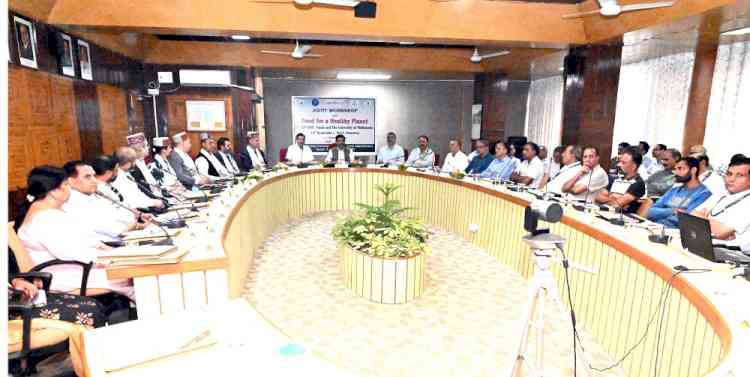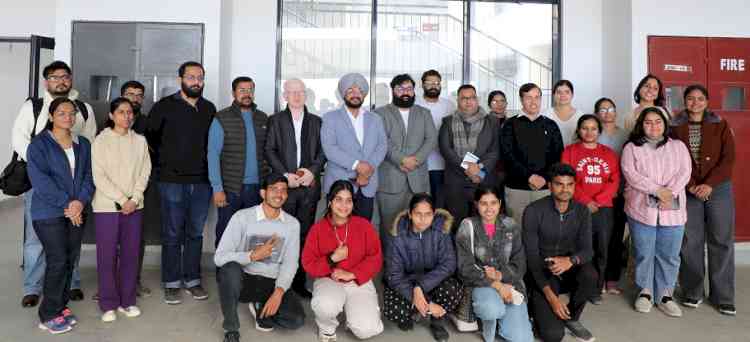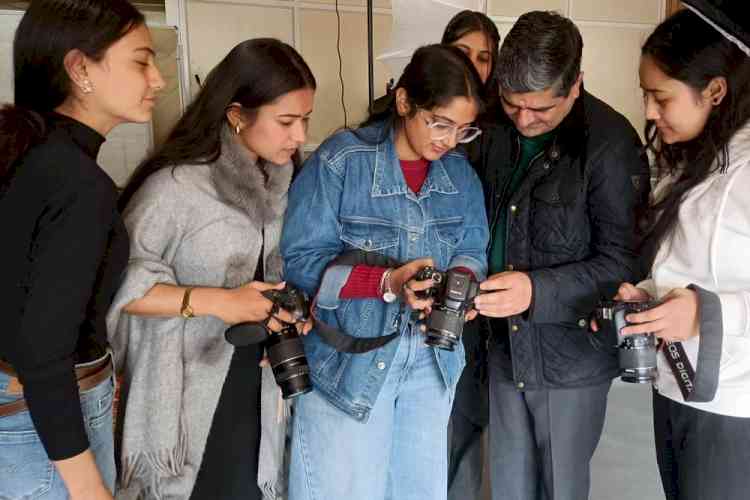Australian, Indian scientists deliberate on ways to provide healthy food
A joint one-day workshop –‘Food For a Healthy Planet’ was organised by the University of Melbourne and Dr. Yashwant Singh Parmar University of Horticulture and Forestry, at Nauni on Monday. The workshop was held with support from the Institutional Development Plan(IDP) of the Indian Council of Agricultural Research’s National Agricultural Higher Education Project(NAHEP).

A joint one-day workshop –‘Food For a Healthy Planet’ was organised by the University of Melbourne and Dr. Yashwant Singh Parmar University of Horticulture and Forestry, at Nauni on Monday. The workshop was held with support from the Institutional Development Plan(IDP) of the Indian Council of Agricultural Research’s National Agricultural Higher Education Project(NAHEP).
A six-member delegation from the University of Melbourne which included Prof. Alex Johnson, Associate Dean (International) from the Faculty of Science; Prof. Giovanni Turchini, Head of School of Agriculture, Food and Ecosystem Sciences; Dr. Antanas Spokevicius, Senior Lecturer Forest Ecosystem Science; Dr. Surinder Singh Chauhan, Director International, School of Agriculture, Food ad Ecosystem Management; Chaira Balsamo, Workshop Coordinator at Melbourne and Loughlin Hooper, Student Recruitment Officer attended the event.
Welcoming the delegates Dr. KK Raina, PI IDP informed that the objective of the workshop was to understand the connections between natural environment, food production, human health and climate change. He added that through the workshop efforts were being made to raise awareness among participants about healthy foods and sustainable food systems, and further develop institutional linkages between UHF Nauni and the University of Melbourne for further collaboration on the research and academic exchange.
Chief Guest Prof. Rajeshwar Singh Chandel, Vice-Chancellor talked about the Natural Farming Initiatives and Challenges and said that self-sufficiency in oil seeds and pulses along with food security with a focus on nutritional security is the need of the hour. Prof. Chandel stressed on the importance of a diversified food basket. He said that cultivated area under traditional crops with high nutritional value have gone down over the years. Prof Chandel added that farmer-friendly practices will have to be implemented and farmers, especially small farmers, will have to be made a part of any programme for it to be successful. He said natural farming has been successfully adopted by the farmers in the state and different crop models have developed in the farmer’s fields. In addition to being environmentally friendly, the input cost has also decreased along with an increase in the overall profit of the farmer under this methodology.
Dr. Navin Kumar Jain, National Coordinator (IDP) and Principal Scientist NAHEP IDP drew attention to the rapidly growing population and said feeding such a huge population which is expected to touch 11 billion by the end of the century, is a big challenge along with production of quality and healthy food. He called for developing a system of sustainable agricultural practices that is also environmentally friendly.
Prof. Alex Johnson gave an overview of the University of Melbourne and its flagship programmes in India. He put forth challenges facing the whole world i.e. healthy sustainable food systems, knowledge and solutions for a healthy planet, and understanding and adapting to climate change. He also gave a presentation on redesigning cereal grain to prevent hidden hunger and remarked that although cereals are incredibly important they are poor sources of dietary iron and zinc. He advocated the biofortification of traditional food crops like wheat and rice with iron and zinc. Dr. Antanas Spokevicius highlighted the value of trees/ wood as a source of energy. Speaking about the domestication of trees, he said the forests need to be managed under sustainable forest management however, there were challenges as domestication required longer times for maturation and was hard to vegetatively propagate. He suggested biotechnological interventions such as molecular breeding and molecular editing to overcome these challenges.
Prof. Giovanni Turchini spoke on the important role of Omega-3 Fatty acids and called for carefully regulating the ratio of Omega-3 and Omega-6. He highlighted the importance of seafood as a source of Omega-3 fatty acids in the human diet. Cautioning on the adverse impact of rapid growing population leading to food security concerns, Dr. Surinder Chauhan said that climate change-induced heat stress is a significant challenge for animals and interventions need to be developed to address this pressing challenge. He said even though India had the largest cattle in the world but issue of low milk yield was a problem. Dr. Chauhan said that India and Australia could work closely as there were many cattle breeds in India that could tolerate heat better while there were many breeds elsewhere that were high milk yielders. He urged policymakers, academicians, practitioners, farmers, experts, and students to work together on the ‘One Health concept’- which treated the health of humans, animals and ecosystems as a single unit.
Loughlin Hooper, Student Recruitment Officer from the Faculty of Science interacted with the university students and acquainted them with the various courses and fellowships offered by the University of Melbourne for international students.
Prof. Atul Khosla, Vice-Chancellor of Shoolini University was the chief guest in the valedictory session, where he called for identifying products and practices which can increase the farmers’ income. He called for developing a transdisciplinary approach in agriculture. Fruitful discussions for developing linkages and joint supervision programmes along with provision for faculty and student exchange were also held during the workshop.
The officials of the Agriculture, Horticulture, Animal Husbandry and Forest departments, representatives of FPOs, progressive farmers, and university scientists attended the workshop. The students of the university's constituent colleges at Neri and Thunag and ELP students of the university attended the workshop virtually.



 City Air News
City Air News 










